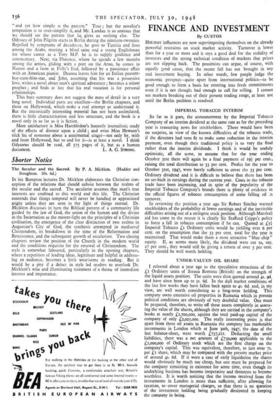FINANCE AND INVESTMENT
By CUSTOS
HOLIDAY influences are now superimposing themselves on the already powerful restraints on stock market activity. Turnover is lower than for a year or more and it says a good deal for the stolidity of investors and the strong technical condition of markets that prices are not slipping ba'ck. The pessimists can argue, of course, with equally good cause, that the recent fall has not brought in any real investment buying. In other words, few people judge the economic prospect—quite apart from international politics—to be good enough to form a basis for entering into fresh commitments even if it is not thought bad enough to call for selling. I cannot see markets breaking out of their present trading range, at least not until the Berlin problem is resolved.
IMPERIAL TOBACCO INTERIM
So far as it goes, the announcement by the Imperial Tobacco Company of an interim dividend at the same rate as for the preceding year is reassuring news for stockholders. There would have been no surprise, in view of the known difficulties of the tobacco trade, if the directors had seen fit to make some reduction in the interim payment, even though their traditional policy is to vary the final rather than the interim dividends. I think it would be unduly optimistic, all the same, to assume that for the year ending October 31st there will again be a final payment of 19J per cent., raising the total distribution to 33 per cent. Profits for the year to October 31st, 1947, were barely sufficient to cover the 33 per cent. Ordinary dividend and it is difficult to believe that there has been no set-back in earnings during the current year. Costs in the tobacco trade have been increasing, and in spite of the popularity of the Imperial Tobacco Company's brands there is plenty of evidence in the official figures of tobacco consumption of some falling off :n turnover.
In reviewing the position a year ago Sir Robert Sinclair warned stockholders of the probability of lower earnings and of the inevitable difficulties arising out of a stringent stock position. Although Marshall aid has come to the rescue it is clearly Sir Stafford Cripps's policy to force a fall in tobacco consumption if he can. Quoted at £54 Imperial Tobacco £r Ordinary units would be yielding over 6 per cent, on the assumption that the 33 per cent. total for the year is maintained. That would make them a most attractive " blue chip " equity. If, as seems more likely, the dividend were cut to, say, 27 per cent., they would still be giving a return of over 5 per cent. They should be well worth holding.
UNDER-VALUED OIL SHARE
I referred about a year ago to the speculative attractions of the £1 Ordinary units of Steaua Romana (British) on the strength of the liquid assets position. The units were then quoted around 4s. 9d. and have since been up to 5s. 60. In the dull market conditions of the last few weeks they have fallen back again to 4s. 6d. and, in my view, are well worth considering as a long-term holding. This company owns extensive oil properties in Rumania which in present political conditions are obviously of very doubtful value. One must be prepared, therefore, to write off these assets completely in assess- ing the value of the shares, although they are carried in the company's hooks at nearly £1,700,000, against the total paid-up capital of the company of only -£2,o25,00o. The really interesting point is that apart from these oil assets in Rumania the company has marketable investments in London which at June 30th, 1947, the date of the last balance-sheet, were worth £757,221. Deducting the small liabilities, there was a net amount of £730,000 applicable to the £2,000,000 of Ordinary stock which are the first charge on the company's capital. This was equivalent, therefore, to just over 7s. per £r share, which may be compared with the present market price
of around 4s. 6d. If it were a case of early liquidation the shares would obviously be much too cheap, but one must be prepared for the company remaining in existence for some time, even though its underlying business has become inoperative and threatens to become worthless. It is worth noticing that the income received from the
investments in London is more than sufficient, after allowing for taxation, to• cover managerial charges, so that there is no question of the investment holding being gradually dissipated in keeping the company in being.


































 Previous page
Previous page